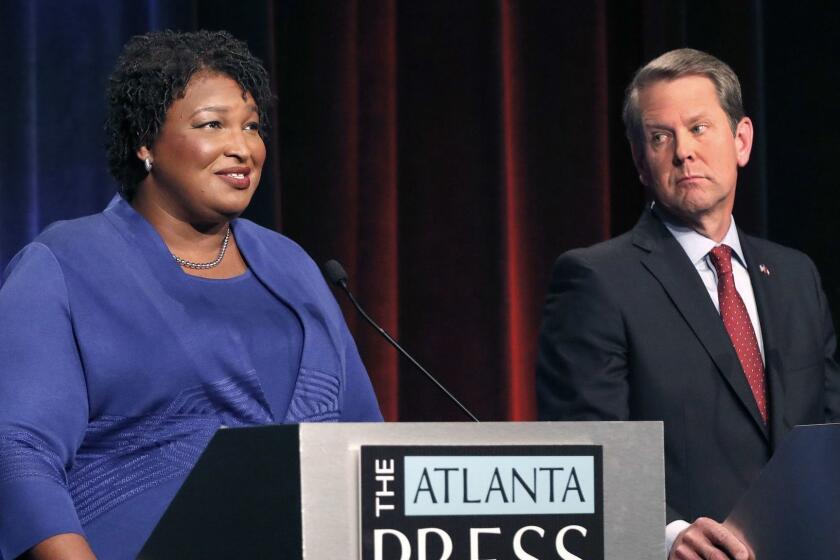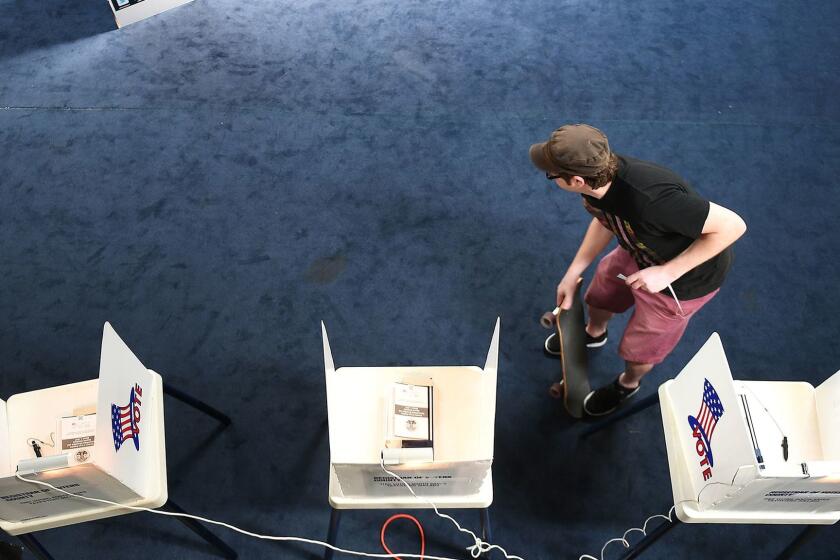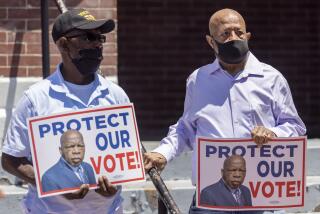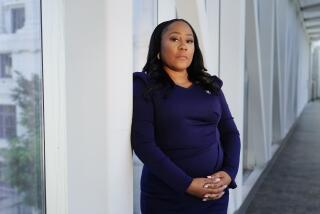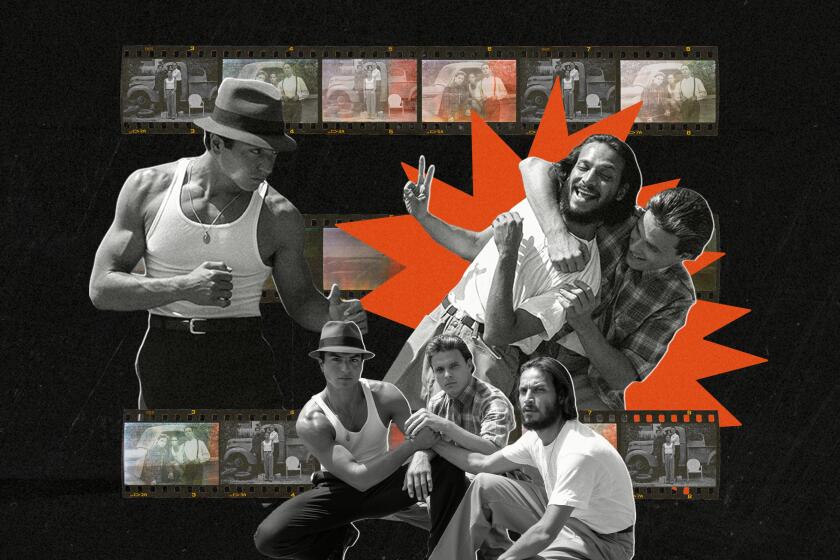Stacey Abrams has a message for Trump after he calls for supporters to vote more than once
Stacey Abrams seems so nice. Then you realize that glow is a flaming sword.
“I try to convert fear into anger and outrage,” she says. “Fear, you curl into a ball, you go into the fetal position. But anger, you go out and you seek justice.”
One of the main story lines to watch in the final two months before the presidential election is the incidence of voter suppression. The Amazon documentary “All In: The Fight for Democracy,” available Sept. 18, addresses such practices as restrictive identification requirements (i.e., whether the signature on one’s ballot is an “exact match” for one’s signature on a government ID), the purging of voter rolls, the removal of polling places and other policies that have disproportionately affected certain groups.
Who better to amplify these issues than Abrams? The Democrat’s 2018 bid to become the U.S.’ first Black female governor was marked by all of those practices (her Republican opponent, then-secretary of state — now governor — Brian Kemp, was in charge of running the election). She narrowly lost and has since made promoting voter rights her mission.
For years, voting rights advocates have been fighting new state laws and rules that make it harder for some people to register to vote or to cast a ballot.
“All In” co-director Lisa Cortés (a current Emmy nominee for HBO documentary “The Apollo”) said the film had to not only tell Abrams’ story but also give enough history to highlight the importance of voting rights and show today’s struggles are not new — “that past is prologue,” said Cortés. “Our film gives you the context, historically, but also shows you the contemporary manifestations of the same old tricks from 100 years ago.”
“This is the first monster movie I’ve ever made,” said co-director Liz Garbus, a two-time Oscar nominee and two-time Emmy winner. “The monster is voter suppression, and no matter how many times you think you’ve slain it, it comes up with a new mask. In Georgia in 2018, voter purges, ‘exact match’ — those were new masks, same old monster.”
President Trump urged people in North Carolina to vote by mail and then again in person — which is a felony.
Abrams videoconferenced with The Times to talk about the state of voting rights in the current election cycle — including President Trump’s recent call to supporters to vote more than once, the controversial actions of the postmaster general, what she sees as serious challenges to the fabric of American democracy and the role of “righteous indignation” in meeting them. This conversation has been lightly edited for length and clarity.
In the film, you say you attended city council meetings when you were still a student and saw how government worked and didn’t work. What’s an example that made a strong impression on you of how government wasn’t working?
I went to Spelman College, which was part of the Atlanta University Center. These were beautiful campuses that sat cheek-by-jowl with some of the poorest housing developments in the city, in the state. I started attending city council meetings in part because, instead of having grocery stores nearby, we had liquor stores. I wanted to know how that happened, and it was zoning rules. So I went to zoning meetings, where I learned people would come in and testify and wealthy communities got [to block] what they didn’t want near them and it was a rubber stamp to say no. But for poor communities, because people were distant from, or didn’t understand, the system, they were constantly being plagued by those predatory practices that tend to keep communities poor. For me, it was about making sure I understood what the rules are. I am a very rules-oriented person. But then to understand how you marry rules with your morality, your activism. It’s not enough to believe it should be so; you have to know how to make it so. That’s why voting rights became such a big part of what I do.
The president recently said to supporters in North Carolina that they should vote twice — both in person and by mail — ostensibly to test the system.
He was suborning fraud. He was telling his supporters to commit the very thing that actually doesn’t happen [to a statistically significant degree] because it’s a felony. In North Carolina, it’s even more egregious because North Carolina does not require intent. You don’t have to prove that someone intended to commit fraud. So they walk in and say, “The president told me to vote in person and by mail”; that person could be arrested and go to prison. Even if they use as their defense they didn’t know and they thought the president said it was OK.
This is a man whose ignorance and his mendacity are dangerous to our democracy. He attempted to clean it up, but he’s ignorant as to the process and, I think, ignorant as to the necessity of a democracy — which means you don’t get to have what you want just because you want it.
Unfortunately, in this cycle, he’s being encouraged by a Republican Party that has spent the best part of the last 20 years trying to meet the demographic changes of our country through increasing constraints on who’s allowed to vote. But the problem is, when you break the machinery of democracy, you break it for everyone.

Trailer for the Amazon documentary “All In: The Fight for Democracy,” featuring Stacey Abrams.
What are the biggest obstacles to this election being conducted fairly?
The solution to a free and fair election is not the conversion of those to whom voter suppression seems like a necessary evil. It is the conversion of those who think voter suppression is impossible to beat. Those are the people I need to reach: those who’ve given up their power because they don’t believe it’s worth fighting anymore, those who are attempting to fight but don’t know the battlefield. My job, our job, is to arm them with information.
If you know that one of the challenges is you may get kicked off the rolls, then double-check your registration. On Sept. 22, make sure you’re registered to vote. If you think your polling place is likely to get shut down because it’s in a poor community, you can sign up to be a poll worker. If they have enough poll workers, they can’t justify closing the polling place.
The average age of poll workers is mid-60s. Because they’re the population most susceptible to COVID-19, they’re refusing to work because they don’t want to die. That’s why [Sept. 1] was National Poll Worker Recruitment Day. We need more poll workers, especially younger ones.
Using those different tactics, we can thwart voter suppression. We can get closer to a free and fair election. Let’s be clear: We cannot eliminate voter suppression in a cycle. It has existed as long as this country has. But what we can do is mitigate it.
For two years, 27 scholars and advocates studied mandatory voting. The conclusion? Universal civic-duty voting in the U.S. would have major benefits for American democracy.
What else would your organization, Fair Fight, have citizens do?
Number one, you will need to make a plan to vote, understanding the full range of your opportunities — voting by mail, voting early in person or voting in person on election day. Make a plan of how you’re going to do it. Then share your plan: Tell others, people who live in swing states. When people are reminded to think about it, they’ll preemptively act. If everyone is publicly sharing it, you create a zeitgeist where making a plan to vote becomes a thing to do.
Number two, as I said earlier: Volunteer to be a poll worker. We need people to make sure those who can’t vote by mail can get into the process anyway.
Then number three: We need people to volunteer to be poll observers. If you go to FairFight.com, you can sign up to be a poll observer or you can be a volunteer. We’re going to be making phone calls and texting, reminding people of how they can vote and answering questions. But also, if there’s a problem, we can deploy volunteers virtually to help.
Democrats have tapped Georgia’s Stacey Abrams to deliver the response to President Trump’s State of the Union address, Senate Minority Leader Charles E.
You previously spoke hopefully that Postmaster General Louis DeJoy, who has made controversial moves that could have deleterious effects on voting in the upcoming election, might change course after congressional questioning. Then he said to both houses that he would not, for instance, restore the mail-sorting machines he removed. How important to the election is the current brouhaha with the Postal Service, and what is the remedy?
There has been progress made; it’s about process versus a single event. The elimination of sorting machines is a terrible blow, but they were also going to not deliver mail and [make ballots more expensive to mail]. There were a lot of different things they were going to do to undermine the process. We have been able to mitigate — that’s my watchword: ‘Mitigation’ is what we need to go for in this election, because we do not have Republican leadership in the Senate willing to solve the problems.
The solution has been encouraging the expansion of drop boxes, encouraging people to start using their vote-by-mail privileges early. We want people to vote by mail, but don’t wait for it, don’t assume it’s going to happen at the right time. Be proactive and go early.
We cannot fix the brokenness of the current Republican Party’s approach to our democracy. But we can meet them on the battlefield and we can fight back. They’re going to win some battles. They’re going to get some things done they shouldn’t. But we’re going to win some battles too.
One I like to talk about is: In January 2020, there were 34 states where you could vote by mail without an excuse. As of today, through litigation and legislation, there are 41. That’s change. And that change happened because people got involved and we were able to push. Those are things that can be accomplished.
If you go to Democracydocket.com, you’ll see a list of all the litigations out there. Georgia was one of the states where we recently fixed one of our problems — you could always vote by mail, that was never a problem. The issue was they threw out your ballot if there was a signature mismatch, which was twice as likely if you were Black or Latino, five times as likely if you’re young. And a fairly high percentage of immigrants had their ballots thrown out. We were able to get a consent decree earlier this year where you’d get to fix your ballot if they think there’s a problem. Just this week, we got a decision that your ballot has to be accepted if it’s postmarked by election day, not received by election day.
This is progress. And it’s progress people didn’t know we needed until this crisis, and when we started talking about voter suppression as a real, living challenge to our democracy.
It’s the start of September. What, realistically, can be achieved before the election to promote access and participation for everyone?
I encourage everyone to go to our website, allinforvoting.com, which is in the film. There are many things we can do. It depends on what state you’re in, it depends on how effective litigation has been. We know in Wisconsin, for instance, there had been an all-out push against vote-by-mail until they realized Republicans needed it too. And now you have Republicans running ads in Wisconsin contradicting Donald Trump.
Democracy isn’t partisan. It doesn’t matter who you vote for; the process should be uniform. If you think about it like basketball, the regulation size of the court doesn’t change from city to city, from team to team. You have to have the same rules wherever you are; that’s what makes it work. Part of our responsibility is to know what those rules are so we can make it work where we are until we get to the place where uniformity becomes what we have.
“All In” co-director Lisa Cortés was just talking about balancing the messaging of fear and hope; that both are necessary.
When people are afraid, they often give up. I like to introduce the challenges, but I try to convert fear into anger and outrage. Righteous indignation requires action. Fear, you curl into a ball, you go into the fetal position. But anger, you go out and you seek justice. When people are out seeking justice, that creates hope. So for me, in the continuum, we begin with fear but we end with action. And if that action creates change, then hope lives. And that’s the mission.
‘All In’
Rated: PG-13
Running time: 1 hour, 42 minutes
Playing: Available Sept. 18 on Amazon
More to Read
Only good movies
Get the Indie Focus newsletter, Mark Olsen's weekly guide to the world of cinema.
You may occasionally receive promotional content from the Los Angeles Times.
